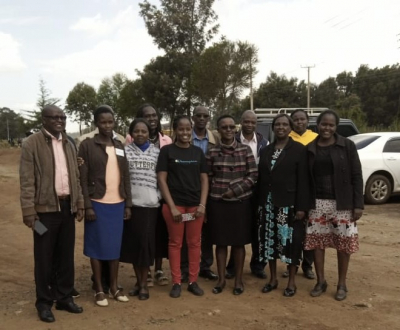Christian Jones, Department of Psychology & Neuroscience

Generous funding from the Charles Lafitte Foundation Program in Psychological & Neuroscience Research at Duke University has come full circle, providing positive experiences for families worldwide.
Eve Puffer, Pamela and Jack Egan Associate Professor of Psychology & Neuroscience, was awarded a Lafitte Faculty Seed Grant to help foster programs that teach families practices that create healthy, functioning environments for children and their caregivers.
In partnership with Duke Global Health Institute (DGHI), Puffer and her research lab study innovative methods to close the mental health treatment gap by incorporating innovative ways to train community members to deliver programs that prevent and treat mental health concerns.
“The disparities are prominent in low-income areas,” Puffer said. “On a global scale, an estimated 20% of children experience mental health concerns. The truth is, that we will never have enough health professionals to close the gap between who needs care and who receives it, so the goal is to train non-specialists within the communities to help fill the need.”
A partnership with DGHI in Kenya has allowed Puffer to work with communities surrounding the town of Eldoret in the western part of the country. Puffer’s team works directly with village elders and religious congregations to understand community needs and respond in ways that make sense for that local context.
“Children are experiencing family and community-level mental health risk factors,” she said. “We want to help children and their caregivers to thrive within safe, cohesive, and trusting families.”
Puffer’s approach is that interventions delivered at family and community levels will help decrease and solve familial conflict, address problems, and improve coping skills among the participants. Such improvements will subsequently improve conflict in homes and mental health outcomes of the family.
Puffer’s team has developed a model called “Tuko Pamoja,” which translates to “We are together” in Swahili. Tuko Pamoja is a two-tiered approach to family intervention. Tier one involves Tuko Pamoja Family Days, which consist of a series of group-based meetings that bring families in the community together in familiar social settings — often religious congregations and community gathering places.
During Family Days, non-specialist providers from within the community facilitate sessions to teach participants problem-solving and coping skills using skits, role plays and activities. Parents sit together with their children and complete communication activities throughout the sessions. Whole-group discussions also take place to build a more supportive community.
The second level of Tuko Pamoja is “Tuko Pamoja Home” which is offered to families experiencing problems in their relationships that cannot be fully addressed during Family Days. Lay providers from within the community are trained by Puffer’s team to provide counseling for these families in their homes using family therapy strategies. The counselors guide families to work together to find solutions to the problems they are facing.
“We hope that Family Days provide these families with a strong foundation and help reduce the stigma and fear around seeking a more intensive level of help,” Puffer said.
Several graduate students in Psychology and Global Health, as well as numerous undergraduates, have contributed to the Tuko Pamoja project — working to develop the intervention, contributing to the research design and analysis, and traveling to Kenya for fieldwork. The intervention model has experienced global and local success thus far.
“The Lafitte grant has afforded the opportunity to place both tiers together this summer in Kenya, to expand services and understand how the two tiers complement each other,” Puffer said. “I recently returned from Kenya, and an undergraduate student is traveling to Eldoret in a couple of weeks to help support the project.”
After the early success of Tuko Pamoja in Kenya, the program has since been adapted to North Carolina amidst the Covid-19 crisis. In the summer of 2023 alone, Lafitte funding has helped to increase the number of Kenyan family participants to 150 families and more than 300 people, which is significantly more than those impacted in the past.
“We hope that we can scale up this program across communities, providing a package of interventions that can help both the general population of families and those with a greater need,” Puffer shared. “If we discover that the model works, then it can be implemented on a larger scale.”